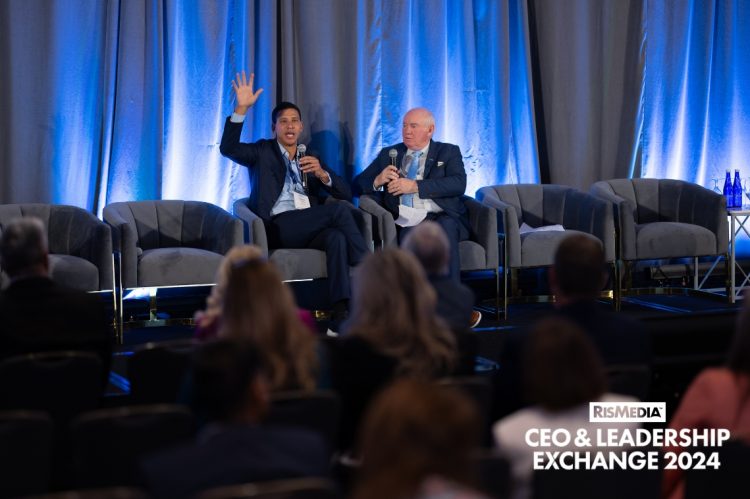Photo credit: AJ Canaria
WASHINGTON D.C.—There were two stories being told on stage yesterday at RISMedia’s CEO & Leadership Exchange, with half a dozen MLS and brokerage executives each sharing their own parts of both sides.
On the one hand, the settlement agreement struck by the National Association of REALTORS® (NAR) has not caused that much disruption. Through a tremendous amount of work educating, experimenting and proactively preparing, the MLS industry is pushing through the transition to mandatory buyer agreements and no compensation offers relatively painlessly.
On the other hand, more change is ahead, starting with a potential repeal of the Clear Cooperation policy, with Compass CEO Robert Reffkin calling for NAR to immediately repeal the nationwide rule, which has been the subject of multiple lawsuits and investigations.
“I think it’s not ‘clear cooperation.’ I think it’s forced cooperation,” Reffkin said, as part of a one-on-one interview with RISMedia Founder and CEO John Featherston.
Just over three weeks after the NAR settlement went into effect, the shadow of even more shifts to the traditional way of doing business was not quite as shocking to an audience mostly made up of brokers and MLS executives, with Reffkin reiterating his “deep” support for the MLS system and the people behind it, even as he pushed for change.
“The thing I’d like to see is MLSs having people use them because they want to, not because they’re forced to. And I think that is inevitable. We need to do that before lawyers make us do that,” Reffkin said.
The Department of Justice (DOJ) has indicated it is still very focused on Clear Cooperation as part of a revived investigation into NAR rules and policies. NAR recently promised to appeal the court decision that allowed the DOJ to continue that inquiry to the Supreme Court—a decision Reffkin was also critical of.
“Is Clear Cooperation that important?” he asked.
One small step
Reffkin’s comments were made just minutes after leaders from some of the largest MLSs in the country took the stage for a panel discussion speaking broadly about the path forward for the industry. That more granular discussion focused heavily on how the industry was adapting—and would continue to adapt—the changes already created through the NAR settlement.
“One of the things that we have found is we’re trying to stay in our own lane, in the MLS lane, but we realized that our brokers and our agents, they’re our customers, and so we needed to pave the way with all these mandatory changes,” said Merri Jo Cowen, CEO of Stellar MLS in Florida.
While most of the speakers said it was too early to share any hard data on how the changes had affected their regions or subscribers, Art Carter, CEO of CRMLS in California, shared one particularly encouraging statistic:
“Since the settlement date…we’ve had about 8,000 listings input into the system. We’ve had eight violations, so I count that as a major win that people paid attention and have not done anything that they shouldn’t be doing in our system,” he said.
Other executives shared qualitatively that they had managed to reach most of their members through various channels, from Facebook lives to in-person, sit-down meetings, saying they felt confident that their hard work was also paying off as agents and brokers adapt to the new rules.
Brian Donnellan, CEO of Bright MLS on the other side of the country, said his organization was staying as tuned in as possible to what concerns—or potentially problematic plans—his subscribers had, going so far as to check out Facebook groups popular with agents.
But he added Bright has so far found the NAR settlement to be more of a “pea gun” than a “Death Star” as far as overall effect on the industry.
A Bright MLS spokesperson later emphasized to RISMedia that Donnellan and Bright believe it is far too early to assess the long-term ramifications of settlement changes on the industry.
Bright was also one of many MLSs that experimented with having “concessions” as an MLS field, with most so far choosing to limit or even remove those fields ahead of the settlement date—though Donnellan said he expected to find ways to use concessions in a way that was both compliant and useful to members, at some point.
“We took all the numbers (away), we took everything out (with concessions), and the reality is, we want to see where it’s going, and we’ll probably introduce more as it goes on,” he said.
But these positive early responses, while encouraging, were only part of the picture. While the MLS panel was not nearly as blunt as Reffkin, they mostly agreed that the MLS industry had more to do as far as evolution and growth.
Dionna Hall, CEO of Beaches MLS (also in Florida), said she expected that NAR might loosen its control of the MLS industry, which could have a domino effect as far as consolidation among smaller MLSs.
“What we’re hearing loud and clear from the Department of Justice is that they want to see autonomy in the marketplace,” Hall said. “They want to see independent decision making…and so I think once the rubber hits the road on what it really means to make independent business decisions, it’s going to be a little bit of chaos out there for some of these (smaller) MLSs that don’t have the resources in place.”
Carter referenced NAR’s communication to the MLS industry back in May, somewhat sardonically acknowledging that MLSs have already come to understand that they are going to be on their own to some degree—particularly when it comes to figuring out how to enforce new rules.
“I think none of us up here are going to be able to tell you exactly how we’re going to do this,” he said. “I love the NAR attorney’s comment to us in May, which was, “Good luck and Godspeed.’”
He went on to describe how CRMLS is grappling with how to enforce buyer agent agreements without overstepping privacy boundaries or overtaxing his organization’s resources, and that issues like those won’t have a “straight answer across the board.”
But these types of evolutions and processes are still connected for the most part to the NAR settlement. Reffkin said for his part, he is looking beyond that, even as he supports—and depends on—the MLS industry.
Going back to Clear Cooperation, Reffkin said he saw the implementation of that rule by MLSs on an individual level as entirely appropriate, but called a national mandate “risky and reckless.”
According to Reffkin, NAR will be considering the rule ahead of its annual meetings in November.
“I think this deserves an emergency decision,” Reffkin said. “Where NAR senior leadership should just say, ‘This is not worth the risk,’ and we move on.”
A Compass spokesperson later clarified Reffkin’s stance on the Clear Cooperation policy, saying that Reffkin specifically is calling for NAR to take the same action it used to agree to the commission lawsuit settlements– one without a full board vote.
Fears about ending the policy—at least some of them—are unfounded, he argued, pointing to MLS PIN, the Massachusetts-based, NAR-independent listing service that did not adopt Clear Cooperation when NAR passed the rule.
“Ninety-nine percent of the listings still get there. Isn’t 99% enough? Do we need it for that last 1%? Do we need to take all this risk?” he asked again.
There is more than just these policy changes facing the industry, though, and while Reffkin spent much of his time focused on the controversial policy, he also went back and forth with Featherston about portals, which he pointed out have a lot more resources than any individual MLS, and often move faster in their decision-making.
“There are board meetings that happen two to four times a year. We’re prepping people for a couple hours. Portals make a decision in a day. And they have tens of billions of dollars to move fast,” he said,
Reffkin urged the audience (including those same executives who represent the largest MLSs in the country) to find a way to create a national, cohesive system for the real estate industry, saying “we will all follow.” He added this kind of system also needs to be focused on listing agents, and not fall back on a “lead diversion” system like Zillow and most of the other big portals, touting Homes.com and its listing-agent focused business model.
When asked directly by Featherston where he saw the evolution of portals in three to five years, and how important they would be to big brokerages like Compass (compared to the MLS system, which Reffkin again reiterated his support for) Reffkin said it would depend on how MLSs evolve to meet the moment.
“This is a platitude, but united we’re strong, divided we fall. I think we’re very divided,” Reffkin said. “If not, other companies are going to use the fragmented nature of our industry against you and us.”
Editor’s note: this story was updated on September 4 at 5:32 p.m. eastern time with additional information from a Compass spokesperson.
Editor’s note: This story was updated September 9 to clarify Brian Donnellan’s remarks with information from a Bright MLS spokesperson.













We should be very clear that from the very outset of its conception, this is a VC-funded company whose stated business model was to create market share on the back of self-serving private exclusives. In fact in the early years circa 2019, it was company policy to require all agents to post their listings for 5 days or so on the broker’s private intranet portal so as to grow market share. This had ZERO to do with “serving sellers better” and everything to do with creating monopoly in the markets where they were buying up smaller brokerages, big teams and mega agents. And one of the top reasons why I didn’t take the bait offered. Love my colleagues throughout the industry, but there is a great deal of hypocrisy in Reffkin’s self-serving campaign. If you disagree, please prove me wrong.
What’s appalling is the NAR has forced Buyers to sign a BAC before entering to see an open house. They will not negotiate terms, and typically have you sign the agreement for a 3-4% commission. It’s been a disaster and are not a ting in their clients best interests.